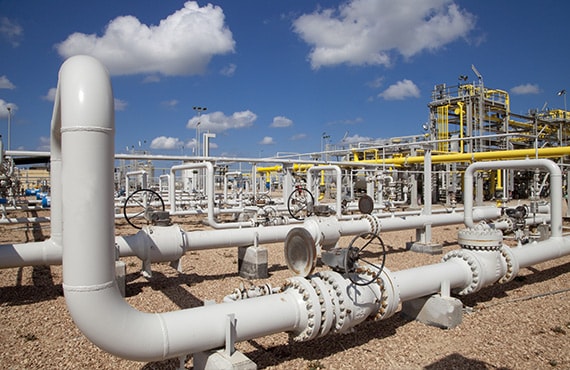Natural gas midstream companies play a pivotal role in the energy sector, ensuring the smooth and efficient transportation of natural gas from production fields to end consumers. This comprehensive article explores the functions, challenges, innovations, and future outlook of natural gas midstream companies, highlighting their critical importance in connecting the supply of natural gas to the growing global demand.
Natural Gas Midstream Companies
Natural gas midstream companies are essential components of the energy industry, facilitating the efficient movement and distribution of natural gas from production sites to end users. This introductory section provides an overview of the role, functions, and significance of natural gas midstream companies in the broader energy supply chain.
Definition and Scope
Natural gas midstream companies are entities involved in the transportation, storage, and wholesale marketing of natural gas. They form a vital link between natural gas producers and distribution utilities or end users, facilitating the movement of natural gas across vast distances through pipelines and other infrastructure.
Key Functions of Natural Gas Midstream Companies
- Transportation: The primary function of midstream companies is to transport natural gas from production fields to processing plants or directly to consumers. This involves an extensive network of pipelines spanning thousands of miles.
- Storage: Midstream companies operate storage facilities where natural gas can be stored during periods of low demand and withdrawn during peak demand seasons to ensure a steady supply to consumers.
- Processing and Treatment: Some midstream companies also engage in gas processing and treatment activities, which involve removing impurities and separating natural gas liquids (NGLs) from the raw natural gas stream.
- Marketing and Trading: Natural gas midstream companies participate in the wholesale marketing and trading of natural gas commodities, balancing supply and demand to optimize pricing and delivery schedules.
Importance of Natural Gas Midstream Companies
Natural gas midstream companies play a pivotal role in the energy sector by facilitating the efficient and reliable transportation of natural gas from production fields to end consumers. This section explores the critical importance of midstream companies, highlighting their contributions to energy security, economic growth, and environmental stewardship.
Facilitating Energy Security and Reliability
Natural gas midstream companies contribute significantly to energy security and reliability by:
- Ensuring Continuous Supply: By maintaining a reliable transportation network and storage capacity, midstream companies help meet fluctuating demand and prevent supply disruptions.
- Supporting Infrastructure Development: Investments in pipeline infrastructure and storage facilities enhance the resilience of natural gas supply chains, particularly during extreme weather events or unforeseen disruptions.
Economic Impact and Job Creation
The operations of natural gas midstream companies stimulate economic growth and job creation:
- Investment in Infrastructure: Building and expanding pipelines and storage facilities require substantial investments, creating jobs in construction, engineering, and related sectors.
- Revenue Generation: Midstream activities generate revenue through transportation fees, storage rentals, and commodity trading, contributing to local and regional economies.
Challenges Faced by Natural Gas Midstream Companies
Natural gas midstream companies encounter various challenges that impact their operations and ability to effectively transport and deliver natural gas to consumers. This section examines some of the key challenges faced by midstream companies in today’s energy landscape.
Regulatory Compliance and Permitting
Navigating regulatory frameworks and obtaining permits for pipeline construction and operation can be complex and time-consuming, impacting project timelines and costs.
Environmental and Social Considerations
- Environmental Impact: Pipelines and storage facilities must adhere to strict environmental standards to minimize ecological disruption and ensure the safety of nearby communities.
- Community Relations: Addressing concerns related to land use, safety, and environmental impact is crucial for maintaining public trust and securing project approvals.
Technological Advancements in Natural Gas Midstream
Recent technological innovations are transforming the natural gas midstream sector:
- Advanced Pipeline Monitoring: Use of sensors and analytics to monitor pipeline integrity, detect leaks, and optimize maintenance schedules, enhancing safety and operational efficiency.
- Digitalization and Automation: Adoption of digital platforms and automation technologies for pipeline management, scheduling, and asset optimization, improving reliability and reducing operational costs.
Future Outlook and Innovations in Natural Gas Midstream
The future of natural gas midstream companies is poised for significant advancements and innovations, driven by technological developments, regulatory changes, and evolving market dynamics. This section explores the emerging trends and innovations shaping the future outlook of the natural gas midstream sector.
Expansion of Infrastructure
- Growing Demand: Increasing global demand for natural gas, driven by its cleaner burning properties compared to coal, is driving investments in new pipeline projects and expansion of existing infrastructure.
- Integration of Renewable Natural Gas (RNG): Incorporating RNG derived from organic waste or biomass into existing natural gas infrastructure, contributing to decarbonization efforts and enhancing sustainability.
Sustainability and ESG Initiatives
- Carbon Capture and Storage (CCS): Exploration of CCS technologies to capture and store carbon emissions from natural gas production and transportation, reducing environmental footprint.
- Community Engagement: Enhanced focus on stakeholder engagement, transparency, and ESG (Environmental, Social, Governance) initiatives to promote sustainable development practices.
Conclusion
Natural gas midstream companies are pivotal in ensuring the efficient and reliable transportation of natural gas from production sites to consumers, supporting energy security, economic growth, and environmental stewardship. Despite facing regulatory challenges and environmental considerations, ongoing technological advancements and strategic investments position these companies to meet the evolving demands of a global energy landscape.
As the world transitions towards cleaner energy sources, natural gas midstream companies will continue to play a critical role in connecting supply to demand while embracing sustainability and innovation.




